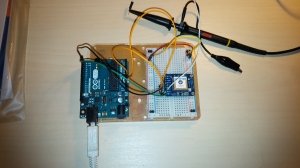During these days i was searching for something modular and scalable that can gives me a clear PPS ( http://en.wikipedia.org/wiki/Pulse_per_second ) from a GPS satellite with some datas like UTC times.I’ve tested the Arduino UNO board with the Adafruit GPS module.
It’s very easy to use them on a little breadboard. The Adafruit GPS is a little receiver with many useful characteristics:
- -165 dBm sensitivity, 10 Hz updates, 66 channels
- 5V friendly design and only 20mA current draw
- Breadboard friendly + two mounting holes
- RTC battery-compatible
- Built-in datalogging
- PPS output on fix
- We have received reports that it works up to ~32Km altitude (the GPS theoretically does not have a limit until 40Km)
- Internal patch antenna + u.FL connector for external active antenna
- Fix status LED
All for 39$. You can take into your hand or create a little circuit , you neither have to configure the UNO to start collect some datas. Just connect wires in the right locations and let the receiver connect to a GPS satellite.
 Using Arduino software is very easy to connect to the board’s UART (serial) and see directly satellite data with position and precise time from Cesius/Rubidium clocks inside the GPS satellites.This is a first output without putting an “echo” code inside the board (no code is required, just connect and watch for serial output) :
Using Arduino software is very easy to connect to the board’s UART (serial) and see directly satellite data with position and precise time from Cesius/Rubidium clocks inside the GPS satellites.This is a first output without putting an “echo” code inside the board (no code is required, just connect and watch for serial output) :
But, if you want to read data in a more human format ,you can use a code and upload into the board, remember before to install the GPS library ( you can download them as zip file from GitHub https://github.com/adafruit/Adafruit-GPS-Library ) and put this code (you can also find it into examples) http://sidmonitor.rf.gd/gallery/pasedcode.txt you will have this output instead:
 So now that we have our circuit operational, let’s check out the PPS value with an oscilloscope :
So now that we have our circuit operational, let’s check out the PPS value with an oscilloscope :
We have here a clear PPS with a freq of 1.00 Hz and a period of 1 s, anyway it’s a good result for a little gps not bigger than a coin and 40 dollars.


Hi Fabrizio
how do you connect the GPS TX and RX to Arduino?
LikeLike
check schematics
LikeLike